00015 英语二自学教程 unit7
- 格式:ppt
- 大小:477.50 KB
- 文档页数:18
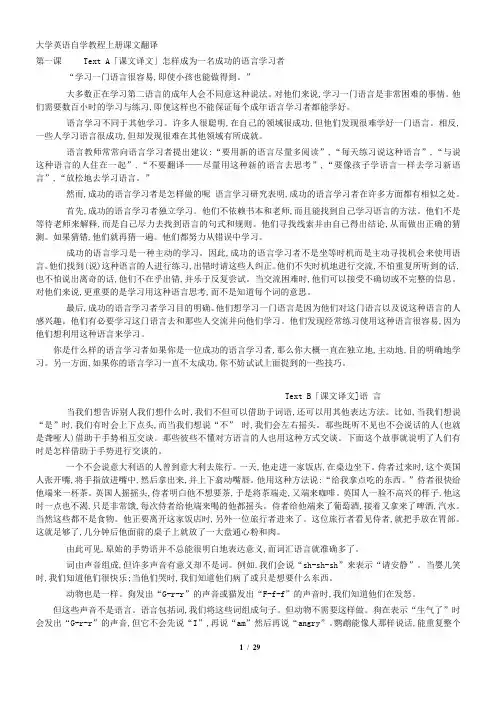
大学英语自学教程上册课文翻译第一课 Text A「课文译文」怎样成为一名成功的语言学习者“学习一门语言很容易,即使小孩也能做得到。
”大多数正在学习第二语言的成年人会不同意这种说法。
对他们来说,学习一门语言是非常困难的事情。
他们需要数百小时的学习与练习,即使这样也不能保证每个成年语言学习者都能学好。
语言学习不同于其他学习。
许多人很聪明,在自己的领域很成功,但他们发现很难学好一门语言。
相反,一些人学习语言很成功,但却发现很难在其他领域有所成就。
语言教师常常向语言学习者提出建议:“要用新的语言尽量多阅读”,“每天练习说这种语言”,“与说这种语言的人住在一起”,“不要翻译——尽量用这种新的语言去思考”,“要像孩子学语言一样去学习新语言”,“放松地去学习语言。
”然而,成功的语言学习者是怎样做的呢语言学习研究表明,成功的语言学习者在许多方面都有相似之处。
首先,成功的语言学习者独立学习。
他们不依赖书本和老师,而且能找到自己学习语言的方法。
他们不是等待老师来解释,而是自己尽力去找到语言的句式和规则。
他们寻找线索并由自己得出结论,从而做出正确的猜测。
如果猜错,他们就再猜一遍。
他们都努力从错误中学习。
成功的语言学习是一种主动的学习。
因此,成功的语言学习者不是坐等时机而是主动寻找机会来使用语言。
他们找到(说)这种语言的人进行练习,出错时请这些人纠正。
他们不失时机地进行交流,不怕重复所听到的话,也不怕说出离奇的话,他们不在乎出错,并乐于反复尝试。
当交流困难时,他们可以接受不确切或不完整的信息。
对他们来说,更重要的是学习用这种语言思考,而不是知道每个词的意思。
最后,成功的语言学习者学习目的明确。
他们想学习一门语言是因为他们对这门语言以及说这种语言的人感兴趣。
他们有必要学习这门语言去和那些人交流并向他们学习。
他们发现经常练习使用这种语言很容易,因为他们想利用这种语言来学习。
你是什么样的语言学习者如果你是一位成功的语言学习者,那么你大概一直在独立地,主动地,目的明确地学习。
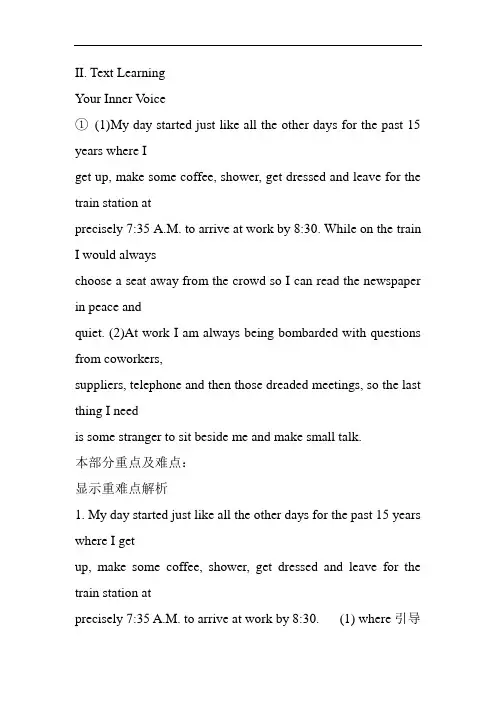
II. Text LearningYour Inner V oice①(1)My day started just like all the other days for the past 15 years where Iget up, make some coffee, shower, get dressed and leave for the train station atprecisely 7:35 A.M. to arrive at work by 8:30. While on the train I would alwayschoose a seat away from the crowd so I can read the newspaper in peace andquiet. (2)At work I am always being bombarded with questions from coworkers,suppliers, telephone and then those dreaded meetings, so the last thing I needis some stranger to sit beside me and make small talk.本部分重点及难点:显示重难点解析1. My day started just like all the other days for the past 15 years where I getup, make some coffee, shower, get dressed and leave for the train station atprecisely 7:35 A.M. to arrive at work by 8:30. (1) where引导定语从句,先行词为days。
(2)make coffee冲咖啡,煮咖啡(3) get dressed穿好衣服(4) leave for 动身去……2. At work I am alwaysbeing bombarded with questions from coworkers, suppliers, telephone and thenthose dreaded meetings, so the last thing I need is some stranger to sit besideme and make small talk.工作中,我要无休止地应对同事、供应商提出的各种问题,电话总是响个不停,还有那些令人恐惧的会议,所以我最不想做的事就是和坐在身边的陌生人闲聊。
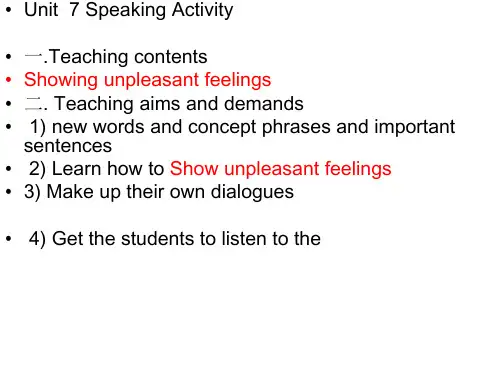

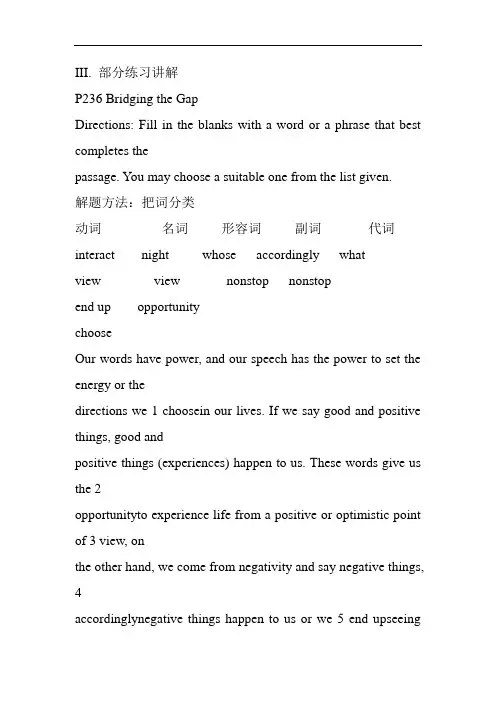
III. 部分练习讲解P236 Bridging the GapDirections: Fill in the blanks with a word or a phrase that best completes thepassage. You may choose a suitable one from the list given.解题方法:把词分类动词名词形容词副词代词interact night whose accordingly whatview view nonstop nonstopend up opportunitychooseOur words have power, and our speech has the power to set the energy or thedirections we 1 choosein our lives. If we say good and positive things, good andpositive things (experiences) happen to us. These words give us the 2opportunityto experience life from a positive or optimistic point of 3 view, onthe other hand, we come from negativity and say negative things, 4accordinglynegative things happen to us or we 5 end upseeinglife as one bigproblem or disappointment.While we are all familiar with our external speech or voice, we also haveanother voice that we work with and 6 interactwith every day. This is our "innervoice". While at first glance you may think: "what is inner voice?" But when youcome right down to it, we are all familiar with our inner voice. Our inner voiceis that small utterance that comes from deep within us, 7 whosejob it is toprovide us with guidance. This is a different kind of communication than 8whatcomes from our normal waking consciousness, which I call our "analyzer".When our analyzer is talking, the communication we receive tends to seem morelike a 9 nonstopconversation that goes on inside our heads all day and sometimeswell into the 10 night .。

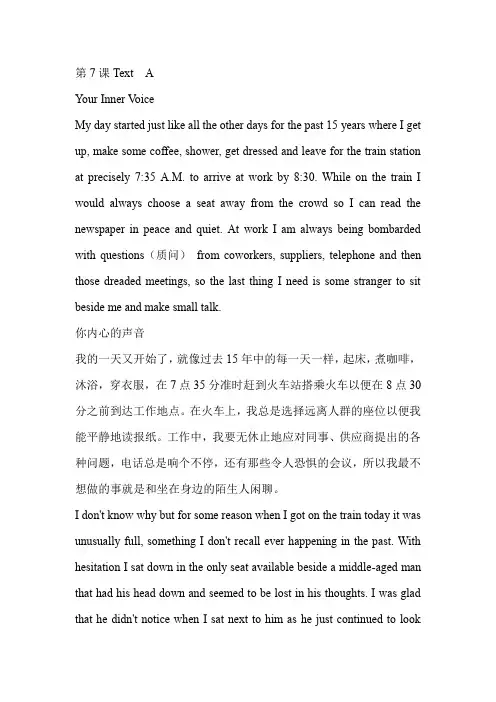
第7课Text AYour Inner V oiceMy day started just like all the other days for the past 15 years where I get up, make some coffee, shower, get dressed and leave for the train station at precisely 7:35 A.M. to arrive at work by 8:30. While on the train I would always choose a seat away from the crowd so I can read the newspaper in peace and quiet. At work I am always being bombarded with questions(质问)from coworkers, suppliers, telephone and then those dreaded meetings, so the last thing I need is some stranger to sit beside me and make small talk.你内心的声音我的一天又开始了,就像过去15年中的每一天一样,起床,煮咖啡,沐浴,穿衣服,在7点35分准时赶到火车站搭乘火车以便在8点30分之前到达工作地点。
在火车上,我总是选择远离人群的座位以便我能平静地读报纸。
工作中,我要无休止地应对同事、供应商提出的各种问题,电话总是响个不停,还有那些令人恐惧的会议,所以我最不想做的事就是和坐在身边的陌生人闲聊。
I don't know why but for some reason when I got on the train today it was unusually full, something I don't recall ever happening in the past. With hesitation I sat down in the only seat available beside a middle-aged man that had his head down and seemed to be lost in his thoughts. I was glad that he didn't notice when I sat next to him as he just continued to lookdown towards the floor.那天我搭乘火车时,不知道出于什么原因火车上异常拥挤,这是过去不曾发生过的。
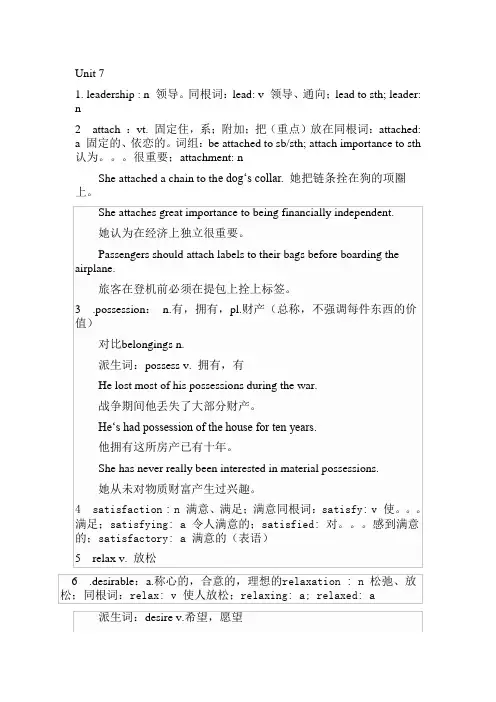
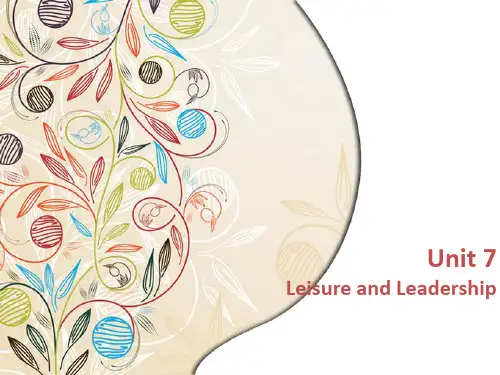
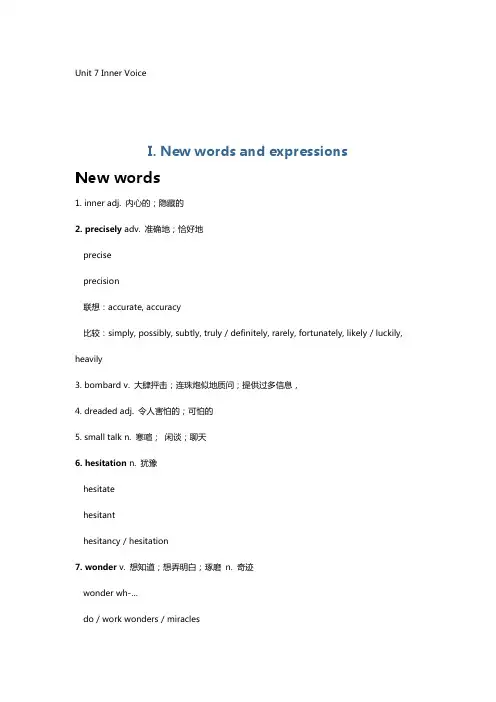
Unit 7 Inner VoiceI. New words and expressionsNew words1. inner adj. 内心的;隐藏的2. precisely adv. 准确地;恰好地preciseprecision联想:accurate, accuracy比较:simply, possibly, subtly, truly / definitely, rarely, fortunately, likely / luckily, heavily3. bombard v. 大肆抨击;连珠炮似地质问;提供过多信息,4. dreaded adj. 令人害怕的;可怕的5. small talk n. 寒喧;闲谈;聊天6. hesitation n. 犹豫hesitatehesitanthesitancy / hesitation7. wonder v. 想知道;想弄明白;琢磨n. 奇迹wonder wh-…do / work wonders / miracles8. prompt v. 促使;导致;激起9. complete adj. (用以强调)完全的,彻底的10. upset adj. 难过的;不高兴的;沮丧的11. roll v. (使)翻滚,滚动12. despite prep. 即使;尽管despite / in spite of that fact that …13. feeble adj. 无效的;无力的14. attempt n./ v. 企图;试图;尝试attempted15. wipe v.(用布、手等)擦干净,抹掉16. profusely adv. 大量地;连连地17. address v. 写(收信人)姓名地址;致函18. receptionist n. 接待员19. attach v. 把…固定,把…附(在…上)attach …to…attached 依恋的;附加的;附属的attachment 依恋;附件20. emotion n. 强烈的感情;情感;情绪emotionalemotionless21. contain v. 控制,克制,抑制(感情)22. apparently adv. 据…所知;看来;显然23. overwhelming adj. 巨大的;压倒性的;无法抗拒的overwhelming problemsan overwhelmed person联想:surprised / surprisingexcited / excitingamazed / amazingdisappointed / disappointingfrightened / frighting注意:excited eyes / expressions / looks24. scream v. 高声喊,大声叫Phrases and Expressions1. be lost in one's thought陷入沉思2. break down 失败3. come up with找到(答案等);想出4. drop…off (顺路)把…放下5. take one's own life自杀6. in desperation 在绝望中;走投无路7. care about sb. 关心;关怀8. take a chance 冒险9. make a difference 有作用;产生影响II. Text LearningYour Inner Voice①(1)My day started just like all the other days for the past 15 years where I get up, make some coffee, shower, get dressed and leave for the train station at precisely 7:35 A.M. to arrive at work by 8:30. While on the train I would always choose a seat away from the crowd so I can read the newspaper in peace and quiet. (2)At work I am always being bombarded with questions from coworkers, suppliers, telephone and then those dreaded meetings, so the last thing I need is some stranger to sit beside me and make small talk.本部分重点及难点:1. My day started just like all the other days for the past 15 years where I get up, make some coffee, shower, get dressed and leave for the train station at precisely 7:35 A.M. to arrive at work by 8:30.(1) where引导定语从句,先行词为days。

第7课Text AYour Inner V oiceMy day started just like all the other days for the past 15 years where I get up, make some coffee, shower, get dressed and leave for the train station at precisely 7:35 A.M. to arrive at work by 8:30. While on the train I would always choose a seat away from the crowd so I can read the newspaper in peace and quiet. At work I am always being bombarded with questions(质问)from coworkers, suppliers, telephone and then those dreaded meetings, so the last thing I need is some stranger to sit beside me and make small talk.你内心的声音我的一天又开始了,就像过去15年中的每一天一样,起床,煮咖啡,沐浴,穿衣服,在7点35分准时赶到火车站搭乘火车以便在8点30分之前到达工作地点。
在火车上,我总是选择远离人群的座位以便我能平静地读报纸。
工作中,我要无休止地应对同事、供应商提出的各种问题,电话总是响个不停,还有那些令人恐惧的会议,所以我最不想做的事就是和坐在身边的陌生人闲聊。
I don't know why but for some reason when I got on the train today it was unusually full, something I don't recall ever happening in the past. With hesitation I sat down in the only seat available beside a middle-aged man that had his head down and seemed to be lost in his thoughts. I was glad that he didn't notice when I sat next to him as he just continued to lookdown towards the floor.那天我搭乘火车时,不知道出于什么原因火车上异常拥挤,这是过去不曾发生过的。
Unit7Inner Voice课后习题参考答案Text AI.1.D 2.C3.B 4.A5.AII.Section A1.precisely2.hesitate3.wonderful4.emotion5.ignorancepleteSection B1.attached2.attempts3.upset4.overwhelming5.prompt6.innerSection Cl.took 2.with 3.for 4.took 5.in 6.withⅢ.1.choose 2.opportunity 3.view 4.accordingly 5.end up6.interact7.whose8.what9.nonstop10.night IV.Section A1.agrees without hesitation2.In desperation,I called the hospital3.prompts me to write this article4.the best solution they could come up with5.Despite a short supply of steelSection B你内心的呼唤就在那里,指引你一路走来,这就是生活。
有多少次你的内心告诉你去做某事,而你反过来选择置之不理,结果却发现自己犯了一个大错?我敢说,在那个时候,你对自己说,“我本应该倾听内心的呼唤的,”有时候,内心的催促是不易察觉的,提醒我们缴费或者给朋友打电话;有时候内心的呼唤会持续不断,一连几天、几周,甚至几年一次又一次地提醒我们还有事情没有完成。
如果你内心的呼唤持续一个多礼拜,一次又一次地产生同样的想法和心情,你就会知道这是内心的呼唤在起作用。
相信你所获得的信息,利用这种信息来指引你的行为。
V.615324Ⅵ.你的内心也许会告诉你如何做出正确的选择,但是,实际上,我们更倾向于听取别人的建议,尤其是大多数人的建议。
自考英语(二)教材课后练习答案课程代码00015Unit 1 The power of languageText AChecking your comprehension1-5 BADACBuilding your vocabularySection A 1-6 consistent statement reflect invalid considerablycomparisonSection B 1-6 credible identify assumption represents evaluatedappropriateSection C 1-6 to forth into on with toBridging the gap1-10 defines action tears good express powerful internally shapes responds to personalTranslationSection A 1. take interests of different social groups into account2. Compare the recent work with the previous one3. was not consistent with his statement to the police4. was not relevant to the affair /matter that was being dealt with5. Please inform us of any change in your caseSection B成为一名灵活的读者,你需要知道怎样选择和使用阅读方式,来与你的阅读目的相一致。
懂得何时以及怎样选用不同的阅读方式会使你成为一个灵活的读者。
当读者的目的是需要很高的阅读理解能力来读懂难度很高的阅读材料时,精读是一名灵活的读者使用的阅读方法。
大学英语自学考试教程下册0015自考英语二课后习题答案unit1Unit 1(英语二)Text AExercises for the TextI.1.d 2.c 3.c 4.a 5.dII.1.alternative 2.fundamental 3.accompany4.implement5.preccedent6.attain7.objectives 8.vary 9.multiple10.isolateIII.1.c 2.d 3.i 4.j 5.g 6.e 7.h 8.1 9.f 10.bIV.our ; helped ; form ; front; to; passed; it; same;V.1.Decision makers should be able to make the best guess at the guture.2.Some people think that everything managers do involves decision making.(or Some people think that everything managers do has something to do with decision making.)3.If there are no correct alternatives,there are no correct decisions to be made.4.Since different people have different ideas about the same problem,so the approaches to it vary from person to person.5.Decision makers usually hold the key to the business development of the company.Vocabulary ExercisesI.1.a.be organized anizatinal anization2.a.simple b.simplified c.simply d.simplification3.a.profit b.profitable c.profitability4.a.intention b.intended c.unintendedII.1.preccdent2.skilled3.achievement4.implement5.optimal6.goal7.accomplish 8.accompanies 9.tendency10.ongoingIII.1.His friend accompanied him to a concert.2.He has argued her out of her decision.3.he owed his success in part to luck.4.According to his suggestion,the formalities have been much simplified.5.The broadcasting station predicts that it will turn cold tomorrow.6.Motion is defined as a change in position or place.Text BExercises for the TextI.1.T 2.T 3.F 4.F 5.F 6.F 7.F 8.F 9.F 10.TII.1.preparation; confidence2.idea3.unattractive indifference4.hardworking; personality; interest5.speechless6.holidays; pay7.clean; neat; conservative8.the floor beside your chair9.politely; naturally10."I beg your pardon?" or "Could you please repeat it?" etc. Vocabulary ExercisesI.1.at a disadvantage2.conservative3.indifference4.make sure5.vague6.clutched7.turned down 8.to your advantage 9.neat10.prospects 11.take the tuouble to 12.placeGrammar ExercisesI.1.连词;让步状语从句。
00015英语二课文精讲讲义(7)Unit 7 Inner Voice(内心的声音)Text A Your Inner Voice你会在百忙之中偷一点时间出来倾听你的心声吗?其实每个人都是天使和魔鬼的复合体,可能你的内心的声音会让你成为天使,也有可能让你变成一个魔鬼。
短文共8个段落,领读课文和单词!一:本课重点词汇讲解,学习1.precisely: adv准确地;precise: adj;反义词: imprecise如:1). We were in precisely the same financial position as before.2). These precise instruments have already gone into mass production.2.hesitation: n犹豫;hesitate: v如:1). My parents never hesitate to tell me when I look bad.2). He agreed to do it without hesitation.3.wonder: v想知道; wonderful: adj极好的如:1). An attractive garden pond can be a wonderful home for wildlife.2). I often wonder about why she treated me like that.4.prompt: v促使,导致;adj.敏捷的;迅速的如:1). Prompt action was required as the fire spread.2).Japan's recession has prompted consumers to cut back on buying cars.日本经济的不景气使得消费者在购买车辆上减少了开支plete:v完成;adj完整的;反义词:incomplete; completely:adv如:1). There has been a complete breakdown of trust and confidence.2).When will you complete the task?6.upset: adj心烦的,(肠胃)不舒服的 v 打翻,弄翻如:1).This decision is likely to upset a lot of people.2).He had an upset stomach.7.despite = in spite of尽管,不同于although,如:1). Despite being a big star, she's very approachable. 她虽然是个大明星,却非常平易近人2). Although she is a big star, she’s very approachable.8.feeble: adj 无效的,无力的;如:He is a feeble-minded man.9.attempt: v/n企图,试图如:1). He made a vain attempt to reach the drowning child.他试图接近那个快淹死的小孩,但没有成功2). He attempted to try again, but failed.10.profusely: adv大量地;profuse:adj 挥霍的,浪费的如:1). He was so profuse with his money that he is now poor.2). He is profusely sweating.11.attach: v贴上,系;附上;attachment: n如:1). With the skin gone, to what can the hair attach itself?皮之不存,毛将焉附?2).Please send your resume by attachment.12.emotion: n情感; emotional: adj感情的如:1). The accused man showed little sign of emotion as he was sentenced.2).He is suffering an emotional disturbance.13.apparently: adv显然;apparent: adj 明显的.如:It was apparent from her face that she was really upset.14.overwhelming: adj压倒性的;巨大的; overwhelm: v淹没;压倒如:1).No difficulty can overwhelm us.2).Our football team has won an overwhelming victory.二.课文重点短语,句子分析、讲解:1. My day started just like all the other days for the past 15 years where I get up, make some coffee, shower, get dressed and leave for the train station at preciously 7:35 A.M. to arrive at work by 8:30.译文:今天和以往的15年一样,早上起床后煮咖啡,洗澡,穿衣服,7点35分准时离开家去火车站,8点30分到达工作工作岗位。